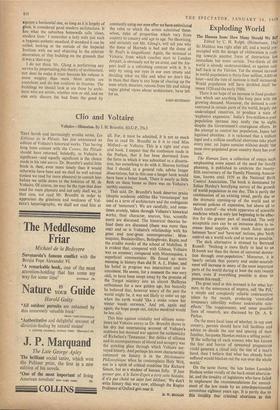Clio and Voltaire
Voltaire—Historian. By J. H. Brumfitt. (0.U.P., 25s.)
THAT lavish and increasingly erudite series, Les Editions de la Pleiade, has just announced an edition of Voltaire's historical works. That having long been content with the Contes, the Pleiade should have returned, belatedly, to Voltaire is significant—and equally significant is the choice made in his vast ceuvre. Dr. Brumfitt's useful little book is, then, even more timely than it would otherwise have been and we shall be well advised (unless we read for mere pleasure) to consult him before we settle down to the histories of M. de Voltaire. Of course, we may be the type that does read for mere pleasure and not only shall we, in that case, not read Mr. Brumfitt in order to appreciate the greatness and weakness of Vol- taire's historiography, we shall not read him at
all. For, it must be admitted, it is not as much fun to read Dr. Brumfitt as it is to read Miss Mitford—or Voltaire. This is a tight and even arid book. I suspect that the confession made in the Preface, that it has been shortened from the form in which it was submitted as a disserta- tion, has something to do with it. Heaven forfend that I should, as a general rifle, advise longer dissertations, but in this case a longer book would have been a better book. There is nearly as little flesh on these bones as there was on Voltaire's earthly ossature.
That said, Dr. Brumfitt's book deserves praise (despite academic oddities like `romanesque' not used as a term of architecture and the ambiguous use of 'testament'). We are carefully, and some- times acutely, taken through Voltaire's historical works; their character, sources, bias, scientific merit are discussed. The historical theories be- hind them are discussed (there was more than one) and so is Voltaire's relationship with his great and near-great contemporaries : Mon- tesquieu, Boulainvilliers, Bolingbroke, Rapin,and the erudite monks of the school of Mabillon. It is evident that, compared with Gibbon, Voltaire was an amateur; compared with Montesquieu, a superficial commentator. He found no more meaning in history than did H. A. L. Fisher, and his belief in progress was intermittent and in- consistent. He seems, for a moment (he was very old), to have been swept away by the promise of the Turgot ministry into an almost Shelleyan enthusiasm for a new golden age, but basically he believed that, however weary of the past the world might be, it was not likely to enter an age when the earth would 'like a snake renew her winter weeds outworn.' And yet, again and again, the hope peeps out, maybe mankind would be less silly.
This bias against credulity and silliness some- times led Voltaire astray as Dr. Brumfitt shows in his dry but entertaining account of Voltaire's stubborn but doomed war against the authenticity of Richelieu's 'Testament.' But dislike of silliness and its accompaniment of blood and savagery was the quizzing glass through which Voltaire sur- veyed history. And perhaps his most characteristic comment on history is in the Dictionnaire Philosophique when he contemplates Holy Writ, not in a spirit of critical erudition like Richard• Simon, but as a student of human folly. 'II taut avouer que, si le Saint-Esprit a ecrit cette histoire, ii n'a pas choisi un sujet fort edifiant.' We don't write history that way now, although the Regius Professor at Oxford gets near it.
D. W. BROGAN


































 Previous page
Previous page